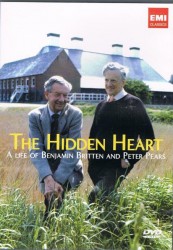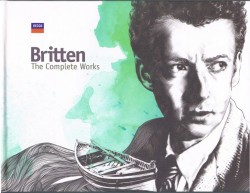Benjamin Bitten: The Complete Works.
Limited Edition of 3,000 copies world-wide.
Benjamin Britten, conductor, pianist.
DECCA 4785364 The deluxe boxed set of 65 CDs, one DVD
includes a 208 page, 6”x 8” illustrated hard cover book.
Of all the omnibus anniversary sets and innumerable artist-driven collections that have arrived recently, none has been more eagerly anticipated in this house than this Benjamin Britten collection. Now it is here in a limited edition of 3,000 copies worldwide in a deluxe boxed set of 65 CDs, with a DVD and a 208-page 6˝×8˝ illustrated book and there is not one whit of disappointment.
My first awareness of Britten (1913–1976) came on recordings of a handful of his arrangements of British folk songs from HMV with Britten accompanying Peter Pears: The Foggy Foggy Dew; The Ploughboy; Come you not from Newcastle?; Oliver Cromwell; The Sally Gardens and some others. I found them very pleasing and looked for more Britten in the record shops. One piece led to another, evolving into a continuing interest in Britten’s other works. Even more enticing was that he was alive then and there would be more to come. And there certainly was!
The Complete Works is divided into four groups: The Operas (CDs 1-20); Stage and Screen (CDs 21-32); Voices (CDs 33-48) and Instruments (CDs 49-61). There are four extra discs described below.
In Voices, discs 46, 47 and 48 contain 100 songs and folksong arrangements, including the above and all the others of that era (1945–47) plus later recordings, including six settings of W.H. Auden sung by Pears, Philip Langridge and Felicity Lott with various accompanists. This group includes the War Requiem, recorded in 1963, with soloists Galina Vishnevskaya, Pears and Dietrich Fischer-Dieskau, plus three choirs, organ, the Melos Ensemble and the London Symphony Orchestra conducted by Britten (CD 33).This compelling work was commissioned for the consecration of the rebuilt Coventry Cathedral in 1962 for which Britten, who had a completely free hand, chose the traditional Latin text from the Missa pro defunctis juxtaposed with nine poems by Wilfred Owen, who was slain in the last days of the First World War. Other works in Voices are the Spring Symphony; Cantata Academica; Saint Nicholas; A Boy was Born; A Ceremony of Carols; Rejoice in the Lamb; Missa Brevis; The Serenade for tenor, horn and strings (with Barry Tuckwell); Les Illuminations; The Five Canticles; The Seven Sonnets of Michelangelo; and all the others including the shorter works.
Until 1945 Britten was widely thought of, particularly in the older British music circles, as clever but superficial ... that was until June 7, 1945. That date marked the first performance of his second opera, Peter Grimes. The audience went wild as did critics and the British music establishment. Britten had emerged as an overnight, international success. He was now a composer of stature, lauded by all and sundry. In the premiere, the wronged, anguished Grimes was superbly realized by Pears, as he was on the 1948 recording of an abridged performance conducted by Reginald Goodall (EMI) and a decade further on in the 1959 complete recording conducted by Britten (CDs 3&4). Once a listener tunes in to Pears’ unmistakable timbre and the emotional depth of his performance, it is very easy to understand why Britten so vehemently disliked Jon Vickers in the role.
With the exception of the brilliant A Midsummer Night’s Dream (CDs 15&16), central to Britten’s operas is a misunderstood, injured and/or offended character who is also something of an innocent. The lonely and misjudged Peter Grimes is a perfect example, but none more deeply touching than Aschenbach in Death in Venice (CDs 19&20), based on Thomas Mann’s well-known story and the last of Britten’s operas. They are all here including Gloriana (CDs 11&12), conducted by Charles Mackerras in 1993. I am particularly fond of The Rape of Lucretia (CDs 5&6) which followed one year after Peter Grimes. Reginald Goodall conducted the Royal Opera House Orchestra with Pears and Joan Cross in 1947 in a truncated version (HMV) that sold me on the work but under Britten in 1971 with Pears (the male chorus) and Heather Harper (the female chorus), plus Janet Baker, Benjamin Luxon and others we have the definitive version.
As there is little space left to muse upon the many more works that continue to attract, let me direct you to the Decca website (deccaclassics.com) where there is a detailed list of the complete contents.
 The last four discs (CDs 62 to 65) are unique to this edition. They are: Making Music with Britten — a documentary with singers, instrumentalists, orchestral musicians and producers recalling their experiences with Britten; rehearsal excerpts of the War Requiem recording sessions; historic recordings from 1944 to 1953 — four recordings including the 1948 Serenade for tenor, horn, and strings with Britten, Dennis Brain and the Boyd Neel Orchestra and also the Four Sea Interludes with Eduard van Beinum and the Concertgebouw; and supplementary recordings from 1955 to 1989. The extra disc is a DVD of the Tony Palmer video of the recording of The Burning Fiery Furnace.
The last four discs (CDs 62 to 65) are unique to this edition. They are: Making Music with Britten — a documentary with singers, instrumentalists, orchestral musicians and producers recalling their experiences with Britten; rehearsal excerpts of the War Requiem recording sessions; historic recordings from 1944 to 1953 — four recordings including the 1948 Serenade for tenor, horn, and strings with Britten, Dennis Brain and the Boyd Neel Orchestra and also the Four Sea Interludes with Eduard van Beinum and the Concertgebouw; and supplementary recordings from 1955 to 1989. The extra disc is a DVD of the Tony Palmer video of the recording of The Burning Fiery Furnace.
The recordings heard are mainly from Decca, who also drew upon the archives of EMI, Virgin, Warner Music, Onyx, Bis and 14 other labels. It is of no consequence, except to pedants, that some very early works and film music are not included.
Earnestly recommended and a must see for those who might be interested is Benjamin Britten: The Hidden Heart, a DVD from EMI (509992 165719). Subtitled A Life of Benjamin Britten and Peter Pears, this 78-minute film produced in 2001 contains interviews and quotes from their associates, friends and relatives together with rare archival footage of significant performances. This is not an apologia but an appreciation and recognition of their symbiosis.




